about me
Long before discovering the triathlon community, I grew up as a swimmer. This included but was not limited to: early swim lessons, competing with my local club team throughout my teens, and spending 90 percent of visits with my grandparents in Florida submerged in the warm pool at their condo.

Club swimming – which largely consisted of me, my sibling, a few peers, a bunch of rambunctious middle school boys, and coaches who only paid attention to you if you were fast – instilled habits and a work ethic that would stick with me in all aspects of life going forward. Skipping practice wasn’t an option if you wanted to get faster, and half-assing the workout wasn’t an option if you were serious about swimming. So I went to practice and pushed myself during each set, and throughout this routine I soon found that I loved it. I loved going to practice every day, I loved the workouts no matter how hard they were, I loved the camaraderie of the team, I loved the rewarding feeling that came from having completed an intense set.
I knew this was something I wanted to keep as a prominent part of my life, so I set out to continue swimming after I graduated from high school. Things they don’t tell you about college swimming: the true meaning of perpetual soreness, how to survive two 6,000-yard practices a day over winter break, and that you should probably learn how to cook something other than Easy Mac. They don’t tell you how strong you’ll become, how you can feel like you’re flying down the lane on a good day, and how you feel like you could eat the entire dining hall in one sitting.

They don’t tell you that, despite your dedication, love for swimming, and participation for an entire year, you can still be cut from the team because you’re too slow. Upset, hurt, and fighting feelings of not being good enough, I reacted the only way I knew how: to keep swimming. At first, I’d go to the pool during open swim hours and do the team’s sets that were still up on the board, but eventually I grew more relaxed and joined the club swim team instead, a much more laid-back environment.

Throughout my years of swimming, the one aspect of cross-training and dry land exercises I always despised was running. Instead of the comfort and ease I felt in the water, running made me feel like every step was a struggle and that my legs and lungs were equally on the verge of giving out. But after I joined the club team, our coach and a fellow student explained how he broke down his runs, first starting off at a pace barely faster than walking, then building slowly until he could go for miles and feel fantastic. An eye-opener for me (you don’t have to do the entire run at the same too-fast-for-warm-up pace?!), I adapted this style of running and found it worked perfectly for my endurance and slow-twitch muscles. It took a solid two years, but I was finally able to say that I loved running. Since then, I’ve completed many standalone road races including a marathon and 11 half marathons, pushing my limits and reaching PRs I never thought were possible at the beginning.
While I was in high school and away at college, my dad, an avid swimmer and runner for much of his life, had started competing in triathlons. I had hopped on my mountain bike with him every so often during the summers, and we’d begun running together once I got over my aversion, so in the summer of 2012 I decided to do my first triathlon. I showed up donning my old swimsuit bearing the name of the team that kicked me off, carried a mountain bike into transition and got several interesting looks, and quickly learned that it’s not all that cool to be one of the first people out of the water, because it just means everybody and their mother is going to pass you on the bike.
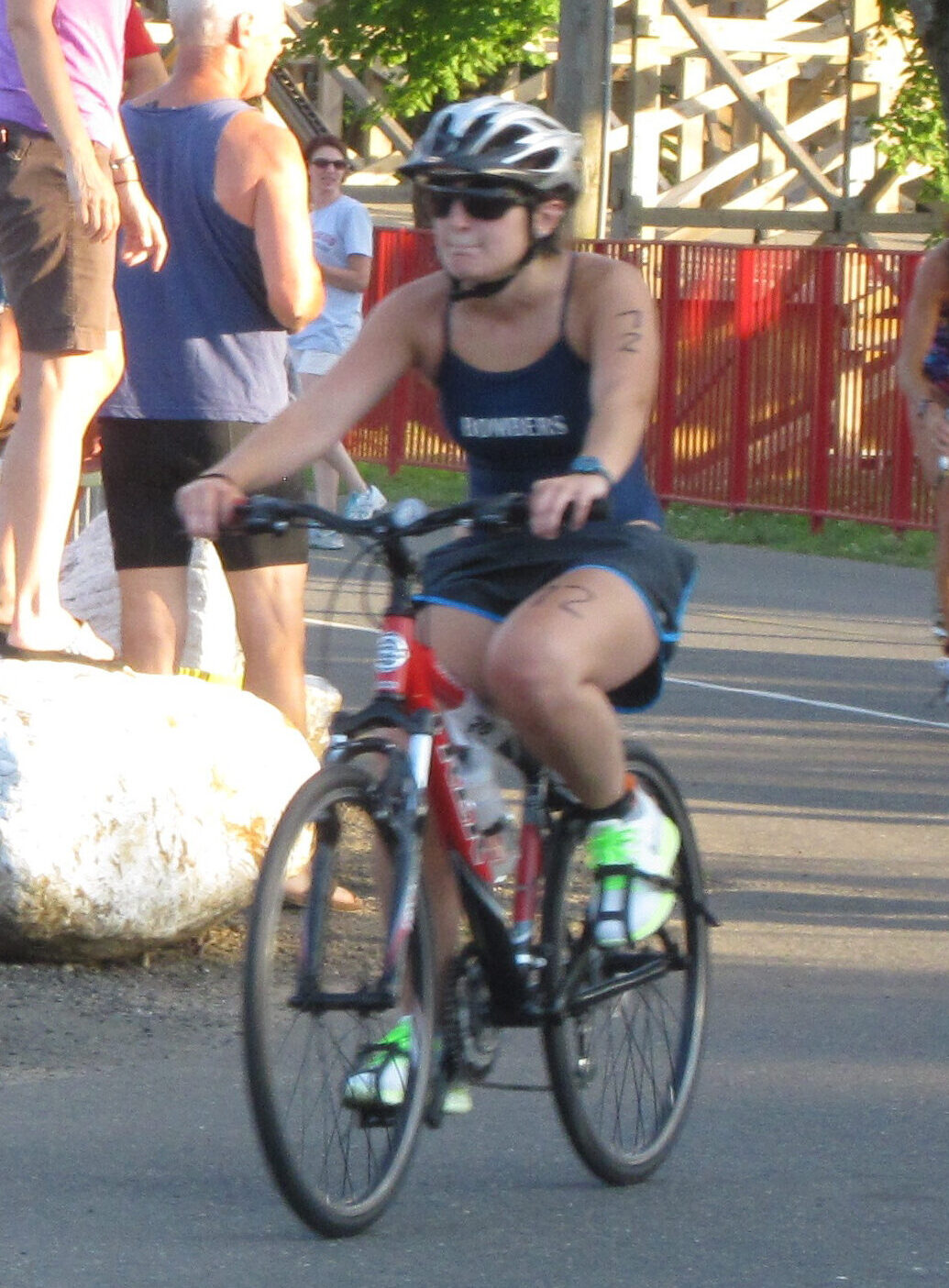
I finished my first triathlon that day and completed one more that summer as well as two more the following summer, after maintaining my new routine of swimming and running during my final year of college. I continued to train with my dad, including a few epic sprint-offs to the finish line at the end of road races, and while I enjoyed the races we did together, I didn’t see myself progressing too far. I decided that sprint triathlons were a good distance, and I didn’t need to do an Olympic-distance race or even get a road bike. I’d be doing my first half marathon that coming fall of 2013, so that would be my big goal, but I didn’t feel the urge to reach for anything higher.
Then, that summer, a friend who swam on the Masters team with my dad and me completed his first full IRONMAN in Lake Placid. I was able to watch the footage of his finish on my laptop, and then I kept watching athlete after athlete run down the chute, unable to turn it off. Warning: when your eyes are glued to the live feed of an IRONMAN finish line for two straight hours, you will have a revelation: you’re going to need to do one of these. I wanted to accomplish this, I wanted to cross the finish line, I wanted to be an IRONMAN.


Of course, the road to accomplishing goals doesn’t come without adversity. My increased training with the goal of an IRONMAN in the back of my mind progressed hand in hand with the struggle of binge eating disorder, and the corresponding anxiety that hindered my progress and mental health. The next several years involved being perpetually caught in a cycle of disordered behaviors, guilt, shame, and fluctuating weight losses and gains that first gave me vast improvements in my running times, and then bounced the other way until I was almost slower than when I first started. Discouraged, I doubted my identity as an athlete. Who dedicates so much time to swimming, biking, and running, and then turns around and counters all of the progress through damaging behaviors with food?
It took years of therapy, formulating new habits, understanding and respecting my body, and altering my relationship with food and with myself, before I pulled out of the struggle. I finally broke the seemingly never-ending cycle, quieted the harmful thoughts and behaviors, and grew to feel positive about myself. Recovery is a process, as is piecing together the puzzle of nutrition as a part of triathlon training, but the tools I’ve gained from my journey have been invaluable in helping me move forward.
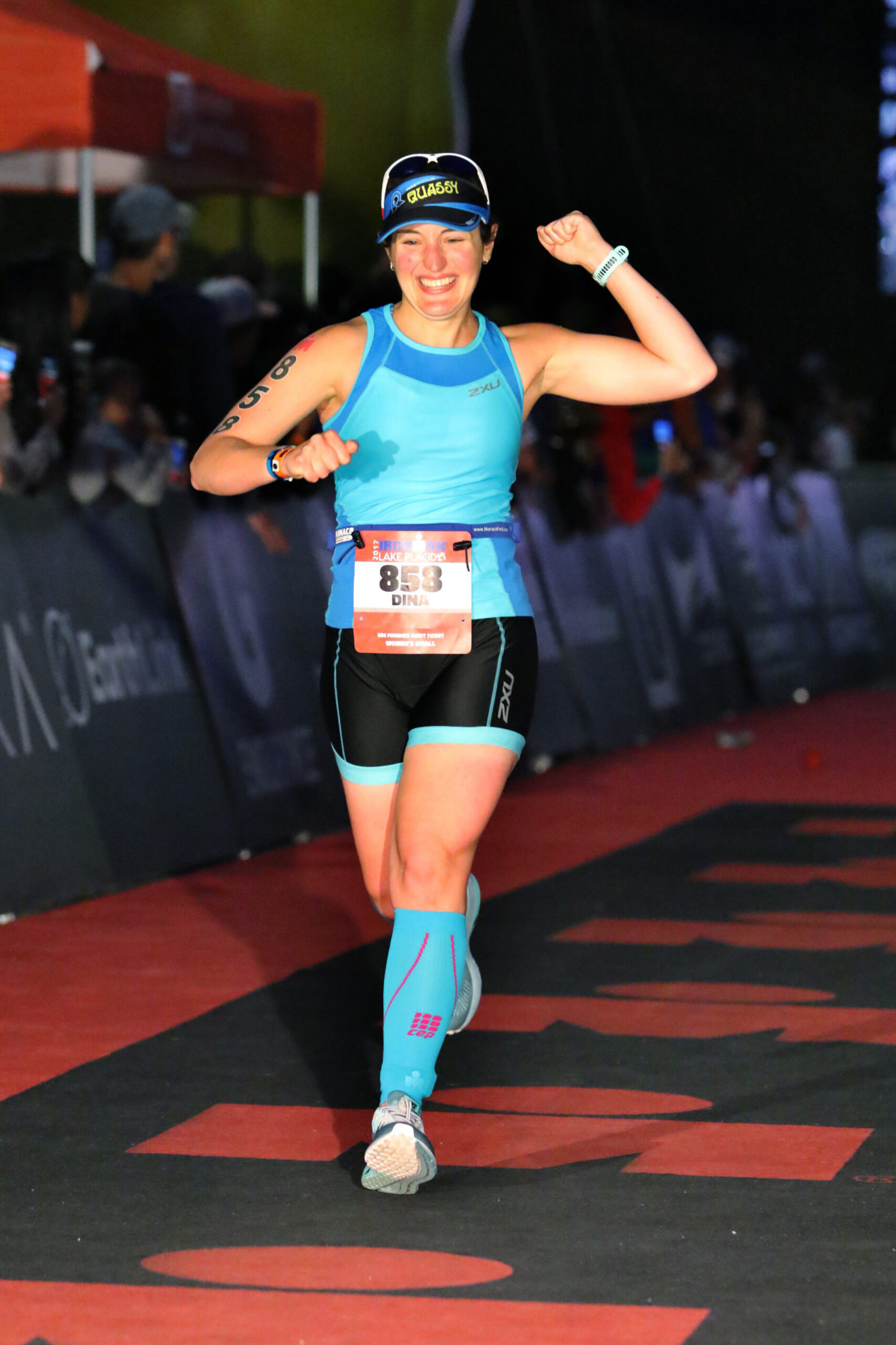
Four years, two road bikes, over 30 triathlons and duathlons, and many road races after that day I watched the live feed of IRONMAN Lake Placid, I crossed the finish line at that very spot, the greatest accomplishment of my life thus far. It wasn’t just the race itself, but the months beforehand of pushing boundaries, exploring unknown territory, and constantly celebrating new accomplishments. I rode 60 miles for the first time, then 70, then 80, then 90, then 100, each ride being something I’d never done before. I loved exploring new routes and hills on my bike for half of my Saturdays, and I loved how my sense of time got so warped that soon a three-hour ride felt like nothing. I loved getting up at 4 am to train (I swear, I really did) and I loved sometimes having three training sessions in one day. I loved having a focus, reflecting on the day’s workouts, and visualizing the race and the finish line. I loved being continually amazed by what my body was capable of doing.


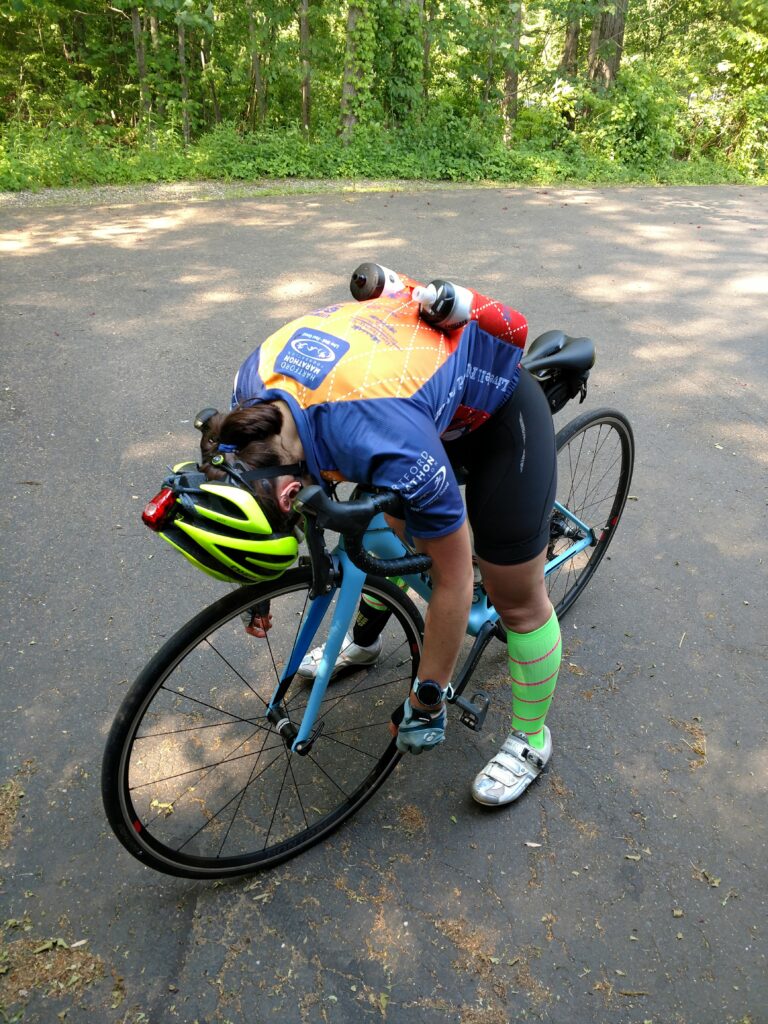
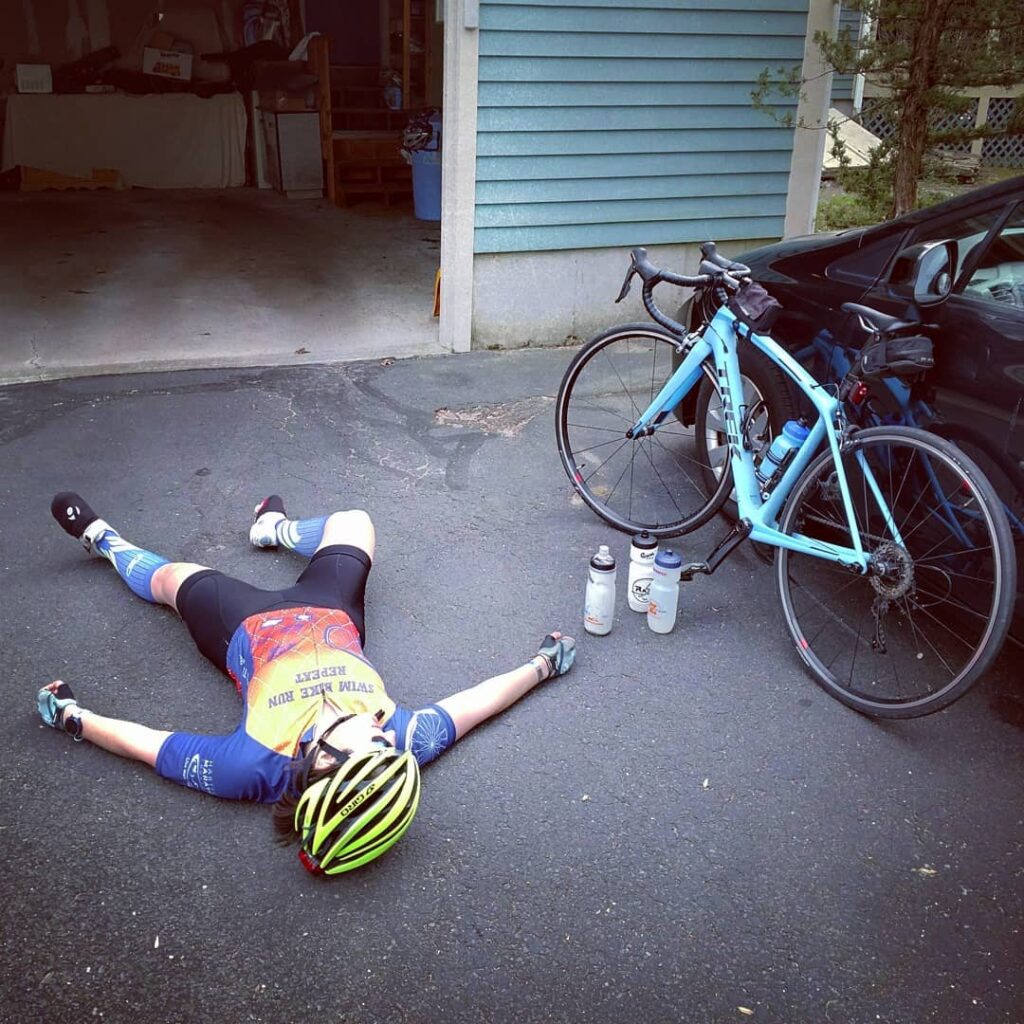
A great number of people use the word “crazy” when describing what I do. “You went SWIMMING this morning? BEFORE work?” “You ran a MARATHON?” (No, just a sprint triathlon, but close enough.) “You rode your bike for FIVE HOURS? FOR FUN?!” Upon confirmation: “You’re crazy.” I’m not a huge fan of being called crazy; it’s not quite accurate. I prefer words like badass. Strong. Dedicated. Persistent. Accomplished. Amazing.
Since completing the IRONMAN, I’ve continued to race sprints, Olympics, 70.3s (sometimes the latter two in one weekend), and various road races. I’ve done a standalone marathon, and I broke the tape at a local sprint triathlon as the first female to cross the finish line.
I’ve joined a local triathlon club and have been part of a few different Masters swim clubs. More recently, I’ve moved from Connecticut to Colorado, where I’ve met a wide array of like-minded folks whose idea of a fun morning is ALSO to ride their bikes up as many hills as possible.


However, I’m not a professional athlete. Triathlon is a huge part of my life, but it’s not my entire life. During my years of training, I also read a lot of books and did a lot of writing and design. I cooked and baked for myself and others. I took Irish fiddle lessons. I kept in touch with friends. I went on vacation. Not to mention previously working a full-time job, with some extra side work every so often. I love these hobbies too, and I didn’t want to give them up while training for triathlons and even the IRONMAN. I wanted to do it all, so I did.
My goal in working with other athletes is to fit any level of training into your lives based on your families, jobs, and other passions and hobbies. Together, working around your schedule, we can find the balance needed to fit triathlon comfortably into your lives without needing to sacrifice anything else you love. If I hadn’t had the proper balance in my life, I wouldn’t have loved IRONMAN training, and if I hadn’t loved training, I wouldn’t have been successful. It is possible to have it all, and we can find that balance.

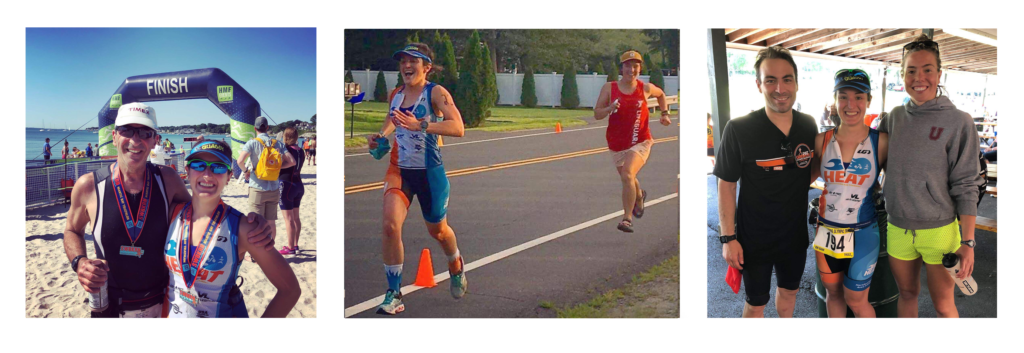
In working with me as your coach, you’ll find we’re in this together. My individualized plans mean I work around your schedule and with you directly to formulate a plan that accommodates your everyday life. I’ll be available to answer your questions, and I’ll use every tool I’ve learned over the years – sport-specific, race-specific, overcoming disordered eating habits and mental struggles – to help you reach your goal.
If you’re interested in nutrition coaching only, fantastic! Don’t worry, you don’t have to do triathlons or any other sport to work with me in the nutrition realm, whether your goal is weight loss or gain, improving overall health, or more. We’ll have weekly check-in calls to formulate actions, keep you accountable, and cultivate a lifestyle of sustainable habits and a healthy relationship with food.
Triathlon, single sport, nutrition – I’m here to help! Send me an email today and we’ll talk about how to get started!
